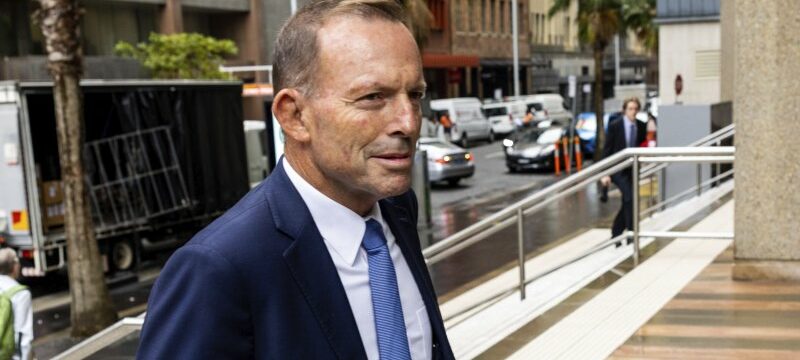Save articles for later
Add articles to your saved list and come back to them any time.
Former prime minister Tony Abbott has accused Labor MPs of gagging figures who are sceptical of this year’s referendum, after he was blocked from appearing at a key parliamentary inquiry into the proposed Indigenous Voice to parliament.
A committee inquiry examining any potential legal risk posed by the words to be added into the constitution will hold its final hearing in Canberra on Monday, at which prominent jurist Frank Brennan will push for a tweak he hopes will win the support of Liberal moderates and bolster the referendum’s chance of success.
Former prime minister Tony Abbott has been blocked from the parliamentary inquiry into potential legal risk of the Voice to parliament.Credit: Ben Symons
Abbott, a firm opponent of the Voice, made a written submission to the inquiry and wanted to appear in person at Monday’s hearing. Coalition members of the committee supported his attendance, but the Labor-dominated committee rejected it, according to multiple sources speaking on the condition of anonymity. His non-attendance has fuelled conservative concerns that the only public probe of the Voice before the referendum has not thoroughly examined the arguments of critics.
“Why gag people?” Abbott told this masthead. “I can’t believe that such a big change is being rushed through with so little scrutiny. By refusing to hear people with insights into how government actually works, this is becoming a kind of sneak attack on the Constitution.
“Everyone with reasonable legal and/or political standing who wishes to appear before the committee should be able to do so. What is the government frightened of; voters discovering that this change is much bigger, much more complex and much more fraught than the government is admitting?”
Committee chair Nita Green, in response to questions about Abbott’s omission, said the committee had prioritised “legal experts and Indigenous representatives from across Australia”.
“As a former prime minister, Mr Abbott has a very large public profile, his views are well known, and he’s made a detailed written submission to the inquiry,” the Labor senator said.
Abbott would not have been the only former MP to give evidence at the inquiry, as former Fraser government Indigenous Affairs minister Fred Chaney – a Voice supporter – appeared at a hearing last month. Abbott has taken a long interest in Indigenous affairs, having held the portfolio in opposition, and as prime minister moved the office under his department. He committed to holding a referendum on minimalist constitutional recognition before he was rolled by Malcolm Turnbull.
Some Coalition MPs have expressed private frustrations at the lack of time afforded to legal figures and grassroots Indigenous people who hold concerns about the Voice, and the short six-week timeframe for the inquiry which, at its conclusion, will have held just five public hearings. By comparison, a parliamentary inquiry into online gambling has held 12 hearings across five months.
Coalition MPs are expected to author a final report that differs in its conclusions from the majority of Labor MPs. They are likely to suggest additional words be added to the amendment, which several experts have deemed to be unnecessary, that would either restrict the Voice’s ability to lobby the executive or add more certainty to parliament’s law-making power over the Voice.
Polling by Resolve Strategic shows a majority of Australians are in favour of the Voice in each state as well as nationwide.
Jesuit priest Frank Brennan, a long-time reconciliation advocate, will appear at the inquiry on Monday and suggest changing the constitutional alteration to permit the Voice to lobby ministers but not bureaucrats. He hopes that change would diminish concerns that the Voice would be involved in thousands of administrative decisions made by governments, potentially making Liberal moderates like Julian Leeser, Simon Birmingham and Andrew Bragg more comfortable with the Voice proposal.
“Constitution-making is always about compromise, or at least it has been until now. Labor has tried to amend the Constitution 25 times and has failed 24 times. Having a few Liberals on board could only help in getting the country across the line,” Brennan writes in an opinion piece on Monday.
Prominent Indigenous figures Warren Mundine, who is a leading No campaigner, will also give evidence at Monday’s hearing, as will Noel Pearson, one of the original architects of the Voice.
Legal concerns about the Voice have been dismissed by an eminent group of former judges and constitutional experts. Of the legal experts called to give evidence at the inquiry, the majority have publicly endorsed the Voice and a number have been involved in providing advice on the wording of the amendment.
However, a smaller group of legal figures – among them former High Court justice Ian Callinan – maintain there is at least some risk that High Court litigation could ensue and that the government may be forced to consult the Voice on some policy matters, potentially delaying the work of government.
The Yes campaign announced on Monday that it had secured the support of the majority of Australia’s major law firms, including Allens Linklaters, Herbert Smith Freehills, Gilbert + Tobin, King & Wood Mallesons, MinterEllison, Ashurst, Corrs Chambers Westgarth and Arnold Bloch Leibler.
The NSW Bar Association and the Law Council of Australia have also endorsed the Voice amendment as legally sound, while the Victorian Bar is debating whether to publicly back the constitutional change.
Cut through the noise of federal politics with news, views and expert analysis from Jacqueline Maley. Subscribers can sign up to our weekly Inside Politics newsletter here.
Most Viewed in Politics
From our partners
Source: Read Full Article

